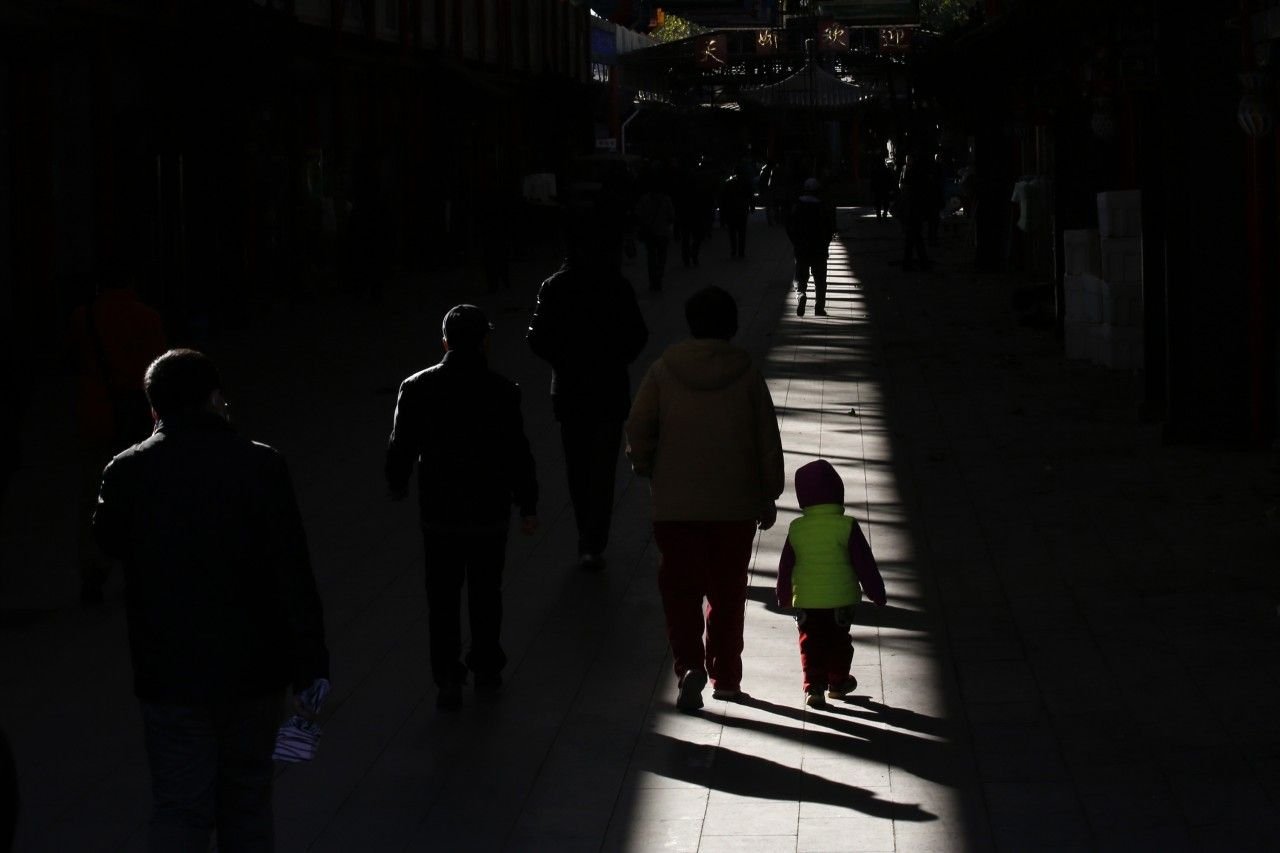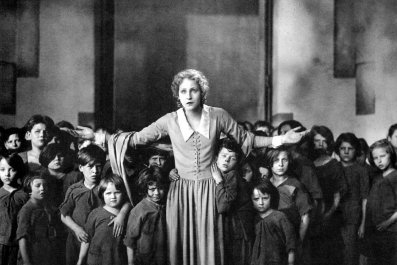Yousheng is a Chinese word translated literally as "healthy birth." In the 35 years since China adopted its one-child policy, for many of the country's 1.4 billion citizens, the term has come to express the official government policy of having just one healthy child. Yet yousheng is also translated as "eugenics," and it is this less savory connotation that more clearly captures an unintended consequence of the highly controversial family planning program - gender imbalance - that now affects the entire world.
Late last year, China's National People's Congress eased the one-child policy. The government didn't exactly admit it was a mistake; according to Chinese officials, the guidelines helped avert 400 million births and in so doing, accelerated modernization. But they are making an amendment to the law, allowing couples to have two children if either parent is an only child (formerly, the law permitted two children only if both parents were singletons).
The change won't lead to a massive population spike; in fact, "the latest change will probably amount to a very small blip," Dr. Therese Hesketh, a professor at Institute for Global Health at University College London, told Newsweek. Hesketh estimates that the bump in population will be about 1 million - a lot for, say, Lebanon or Costa Rica, but that number barely moves the needle for China.
"Many Chinese like this policy change as it gives them a choice," Hong Zhang, an anthropologist and professor of east Asian Studies at Colby College, told Newsweek in an email. Dealing with the profound and far-reaching devastation caused by the policy, however, will take many years to fix. If it can be fixed.
One Child, Two Xs
At the birth of the People's Republic of China in 1949, officials counted 542 million total residents in a territory slightly larger than the U.S. (Americans then numbered about 149 million.) In 1979, just three years after Mao's death, the government instituted a one-child rule to curb China's population, which had ballooned to 975 million; official thinking was the country could not continue to provide for more people.
Enforcement of the one-child policy during the early 1980s was controversial not only in China but around the globe. Early stories emerging from the rural villages focused on coercive practices, including forced late-term abortions and involuntary sterilization, as well as the "neighborly" snitching on pregnant couples who dared to conceive a second child. Backlash in rural communities throughout China prompted the government to modify the rule in the mid-1980s, allowing a second child in families whose first child was either a girl or disabled.
This pairing of "girl" and "disabled" is hardly an accident. Masculinity is the crux of Chinese society - sons not only carry on the family line, they also are expected to provide for their parents in old age. A daughter, once she marries, is obligated only to her husband's family. In other words, parents cannot rely on a daughter to help them in their old age. This dynamic combined with a one-child policy plus the kind of harsh economic realities often found in rural Chinese villages does not engender much love for daughters. The social message: Survival depends on sons, and daughters are only a burden.
"It's clear to me that having two x chromosomes is being processed in this culture as akin to having the most severe type of birth defect and you would be better off not carrying that pregnancy to term," Valerie M. Hudson, a principal investigator of the WomanStats Project, told Newsweek. She argues that a long-standing devaluation of the lives of females coupled with the one-child policy has helped to create an abnormal gender imbalance in China - a dystopian nightmare manufactured by the state.
In demography, sex ratio at birth (SRB) is defined as the number of boys born for every 100 pregnancies. Across cultures and geographical locations, SRB is "remarkably consistent," according to Hesketh, and is generally accepted to be roughly 103 to 107 male babies born for every 100 females. Mother nature has good reason for this imbalance: male babies are more vulnerable to disease, and as they grow a little older, they tend toward riskier behavior. By the time all of these babies have reached their reproductive years, the initial overabundance of boys has dwindled so that the gender split is roughly even in adulthood.
Yet, for China during the years of the one-child policy, SRB has become increasingly unbalanced, starting from a rather healthy 106 in 1979, rising to 111 in 1990, and peaking at 121 in 2005. In some rural areas, the SRB was thought to have been as high as 130. Current estimates suggest the ratio dropped down to 118 in 2010 - better, but still significantly too high. In China, there are currently 32 million more boys under the age of 20 than girls.
40 Million Too Many Men
Medical advancements and technology have played a key role in creating this surplus of boys. "The Chinese government contracted with GE to provide cart-mounted ultrasound that could be run on generators so that the most obscure village had access to fetal sex determination," said Hudson. Given the ability to know the sex of their unborn children, many parents aborted female fetuses. Sadly, such abortions do not account for all of the missing girls in China.
In Pearl S. Buck's The Good Earth, there is a scene where a Chinese father hears the first cry of his second daughter, followed by silence; sitting in another room unable to see what has happened, he nevertheless realizes his wife has killed their newborn girl. This may be fiction, but it is based on China's long history of infanticide. Terence H. Hull, a demographer and epidemiologist at the Australian National University, writes in his study, Recent Trends in Sex Ratios at Birth in China, "Two centuries ago the practice of exposing female infants to the elements was conducted openly, and Jesuit missionaries recorded that thousands of such infants were abandoned in the streets of Beijing to be collected regularly by carriers who placed them in a large common grave outside the city." Between 1851 and 1948, about 5 percent of female babies and 2.5 percent of male babies were killed in this way. Although female infanticide is rare these days, the intentional elimination of female offspring may still be occurring in a more insidious fashion: through slow starvation, ongoing neglect of sick girls or even complete abandonment.
Over the next two decades it is expected that China will see steadily worsening sex ratios in the all-important reproductive age group, so much so that it is predicted there will continue to be millions of "excess" men - a full 12 to 15 percent of young adult men with no hopes of marrying.
No matter what change the state has made to its one-child policy, it will continue to haunt the country for years. The cruelest effects of this lopsided gender seesaw will be felt by the involuntary bachelors living in a culture in which marriage is expected. These surplus men are sometimes disabled (20 percent), often illiterate, and nearly always the ones who have been left behind to live in rural communities with limited financial prospects.
A World of Bare Branches
China is a lineage-based society and "bare branches," evoking images of family trees, is the term the people use for these unmarried men who represent the end of the line for their families. These bare branches are poorly regarded by their communities; a recent Xi'an Jiaotong University survey found that 48 percent suffer discrimination, which often extends to their parents. All of this leads not only to deep feelings of shame, but very real health effects as well, including higher-than normal rates of stress and alcoholism.
For example, in a recent study, Hesketh and her co-authors discovered, after surveying a total of 1,059 never-married men and 1,066 married men, that the never-married men had higher depression scores, more thoughts of suicide, and higher aggression scores than married men. "From spending a lot of time there, there's a lot of underlying aggression in Chinese society and it doesn't take much to provoke it," Hesketh said.
In Bare Branches: The Security Implications of Asia's Surplus Male Population, Hudson and co-author Andrea den Boer argue that societies with high male-to-female ratios more readily become unstable, which could result in internal or external violence.
The mental health issues ripple through society. One study discovered that 14.7 percent of unmarried men admitted having paid for sex in 2000 - about double the rate for married men. More likely to engage in commercial and unprotected sex, these men are likely the drivers of a growing market for female trafficking. Women from the around the world - especially nearby countries, including Myanmar, Vietnam, Laos, Singapore, Mongolia and North Korea - are trafficked to China for commercial sex exploitation in growing numbers; in 2013, the U.S. State Department designated China as one of the world's worst offenders in combating human trafficking. "China has become the sex- and labor-trafficking capital of the world," said U.S. Representative Chris Smith, R-N.J., at the time.
It appears that the outraged cries from within and without have been heard. The Chinese government has spent millions of dollars in recent years to fund research into the implications of this radical skew in gender population numbers. Recently, China has also reshaped social policy. For example, it is setting up small old-age pensions; creating preferential admission to universities for families that have only girls; and making sex-selective abortions, which are illegal, even more difficult to obtain by cracking down on ultrasound procedures after 14 weeks of pregnancy, the time at which the genitals of a child can be discerned.
China's more relaxed family planning laws and re-imagined social policy will help, but a crippling gender imbalance will continue for many, many years. A true restoration of natural sex proportions may never happen. By virtue of China's large population (and the large population of India, which also skews male), gender imbalance is now a global concern. "The overall sex ratio of the world now is something like 101.4, so for the first time that we have records, there are actually more men on planet Earth than women," Hudson said.

























